|
Natural areas like Prince William Forest Park are where wildlife live and thrive and observing wildlife is one of the many experiences that draw millions of people to national parks annually. Observing wildlife is one of the many benefits of visiting national parks but it is important to know the steps that you can take to keep yourself and wildlife safe. Wildlife Basics
See Something, Say SomethingIt is important to the safety and wellbeing of wildlife, yourself, and others to report any of the following to park staff:
Report any unusual or illegal activity to park staff immediately by calling park dispatch at 866-677-6677. Dangerous WildlifeSome of the wildlife found in Prince William Forest Park can pose particularly dangerous hazards to people and pets and should be avoided. In certain cases, medical treatment may be necessary if you are bitten or attacked by some of these insects and animals. Seek medical treatment immediately if you are injured by an animal or experience allergic reactions as a result of an interaction with wildlife. 
InsectsTicks The park staff encourages daily tick checks even if you were outside for a short amount of time. Most ticks must be attached for 24 hours or more before tick-born disease are transmitted. Make sure to check yourself and seek medical attention if you develop symptoms of Lyme disease. 70-80% of infected people develop a reddish "bulls-eye" or an expanding red ring around the bite site and flu-like symptoms. 
Chiggers Chiggers are frequently found in the bush.The larvae can bite you and cause severe itching.To treat, wash affected area and apply anti-itch lotion.If site becomes infected or severe allergic symptoms occur, seek medical attention. 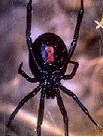
Black Widow Spider Black Widows have a black, shiny globe-shaped body with a red or orange hourglass shaped marking on the underside of it's abdomen. This spider may attack if it feels threatened. Seek medical attention if you develop symptoms such as target-like marking and swelling at wound site, muscle pains, weakness, headache, nausea, sweating, dizziness, or increased blood pressure within two hours of the bite. 
Brown Recluse Spider This spider has a violin shaped mark on its back and may bite if it is provoked. They are found most often in dry, enclosed, spaces. If left untreated, venom from a brown recluse spider can cause tissue damage. 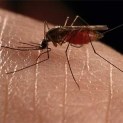
Mosquitoes While mosquitoes are harmless, some carry diseases like West Nile Virus which can be a potentially serious illness. Visitors are encouraged to use insect repellants with DEET, ensure that tent netting is in good condition, and wear long sleeves and pants when possible in areas that mosquitoes are most active (streams, ponds, lakes, etc.). 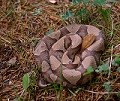
SnakesNorthern Copperhead This snake is venomous and may attack if provoked. Copperheads are very common in the park but should be avoided. Northern Copperheads are reddish-brown with dark hourglass pattern markings down their backs. They have a bright copper colored head and are 2 to 3 feet in length. Copperheads are very common in the park and will usually freeze and remain motionless when they sense danger. However, they should be avoided at all times. Seek medical attention immediately if you are bitten by a Northern Copperhead. 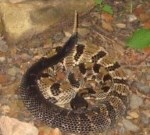
Timber Rattlesnake The Timber Rattlesnake is venemous and may bite if it feels threatened. Timber Rattlesnakes are bright yellow to dull gray in color and have brown or black chevron shaped markings along their backs. They have a rattle at the end of their tails and can grow up to 6 feet in length. They are most active from late April to mid October. Seek medical attention immediately if you have been bitten by a Timber Rattlesnake. 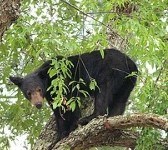
MammalsBlack Bears Black bears are the smallest of the three bear species living in North America. They typically will not approach or interact with people but will react if they feel threatened. Never approach or feed a bear. |
Last updated: June 3, 2024
